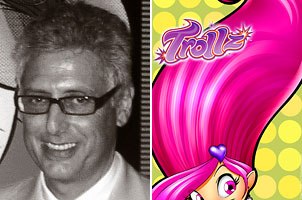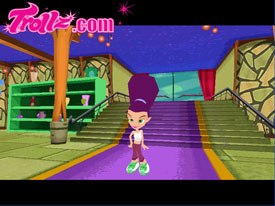John Michaeli talks with DIC head Andy Heyward about changes in kid audiences and how that has impacted his company.

Andy Heyward of DIC has implemented a new strategy to concentrate the companys efforts on one show annually instead of trying to launch a number of projects. This year, DIC is pushing Trollz all the way. All images © DIC Ent.
DIC Entertainment will produce fewer animated TV series in the future in place of developing one blockbuster series designed with enhanced appeal to broadcasters and high-profile licensing partners. The new strategy is DICs response to changing domestic and global kids market, said Andy Heyward, president/ceo.
Though we produce fewer shows, our business has grown dramatically, he said. By not putting more cars on the train, we make the train go faster.
Heyward recalls in prior seasons DIC produced six to eight new shows. We dont have the time today to make six series and really develop them and make them all work.
This year DIC is producing one new series, the animated `tween series Trollz. Heyword described the marketing push behind the series like the invasion of Normandy. We are more interested in doing one series and doing it intensely.
The executive sees a constant expansion of outlets for product. He recalls when he got in the business in 1971 three broadcasters ABC, NBC and CBS dominated the business. Today the pie is divided not amongst three but perhaps as many as 35 or more. He said these include broadcasters such as The WB, FOX, Nickelodeon, Cartoon Network, The Disney Channel, UPN, HBO, among many others. This has caused a tremendous cannibalization of the audience, he said.
Heyward also sees fragmented kid audiences developing because of new and emerging technologies, such as computers, videogames, streaming media, now available on cell phones, and the changing interests of young people.

Trollz.com is one way Heyward hopes to reach the fragmented youth market.
This explosion of technology is dramatically changing the way kids get their entertainment, he said. Technology is causing an age compression. Kids are growing up much, much faster. Twenty years ago little girls played with dolls longer. Today they dont play with dolls after the age of seven. Boys once played with action toys until they were 10 or 11. Now, they are on to other things from the world of technology, which is forcing them to become older, quicker.
Heyward said these new influences on young people are forcing advertisers to direct their messages at wider ranges of demographics, leading to more places for programmers to sell shows. But the amount of revenue from our shows is smaller because the audiences are smaller, he adds.
He said years ago a studio would sell a show to a network and earn about $250,000 for a half-hour episode. A small amount of income was also generated on international sales. Today, with the same show, the license fee is a tiny fraction of that, because of smaller audiences. The day when a Smurf series could attract a 60 share will never again happen. With so many choices for audiences, no broadcaster will ever get those numbers.
Now, producers must work through all potential revenue streams. They need to look at video, the Internet, publishing, toys and international sales, he said, adding, and new networks are sprouting up overseas and need product.

DIC Kids Network offers a three-hour programming block.
Heyward is constantly traveling the world seeking new revenue streams and partners. He speaks multiple languages. He has produced programs in Germany, Spain, Japan, China, among other international production centers. This keeps him out of the office and working closely with business people. I have an outstanding creative team at DIC, and they fill in for me when I am traveling, he said.
I enjoy meeting new people and learning to speak their languages, he said. China is becoming increasingly important to us, as is all of Asia.
Heywards father, Deke, was a film executive in Europe when he was a kid, giving young Andy an early understanding of international culture. A graduate of UCLA with a major in philosophy, Heyward, has a restless personality and an uncanny knack for discovering new avenues for generating wealth. His early targets for developing product were the U.S. market. Now, his revenue-producing targets are worldwide.
As an example, Heyward points to multiple revenue streams anticipated from the Trollz property. DIC has reached agreements with key broadcasters in major global territories and has deals with major merchandise partners such as Hasbro, Scholastic, Warner Home Video, Mamiye Broz and One World Interactive.
DIC is leading childrens entertainment company and full-service studio. It offers the DIC Kids Network, a three-hour programming block for youngsters designed to assist broadcasters meet their FCC educational programming requirements. It also has consumer and home entertainment divisions. The company was founded in Paris in 1971 and was acquired by Andy Heyward in 1986. The company is headquartered in Burbank, California with offices in New York, Paris, London and Cologne.
John Michaeli is a recognized specialist in animation, beginning his animation career with Hanna-Barbera Productions. He remained with the company as vp of publicity & advertising for more than 15 years before moving on to a vp position with DIC. He held senior executive positions with Warner Bros. Domestic Distribution where he launched the first Batman the Animated Series. From there he moved to Disneys Buena Vista Television, working on The Disney Afternoon. He has been responsible for the media launches of PAX-TV, the Fox Family Channel (now ABC Family), and the U.S. introduction of interactive company OpenTV. He is currently writing a book on Saturday morning television.







